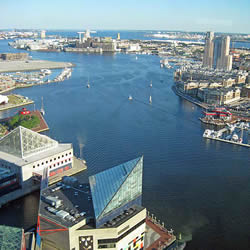Two residents of Baltimore, neither of whom have any affiliation with environmental protection groups, filed a lawsuit this week alleging that the city of Baltimore has permitted toxic chemicals to enter the Patapsco River at the site of the construction of a new Horseshoe Casino.
The plaintiffs are suing the city of Baltimore for allowing trichloroethylene and arsenic, amongst other chemicals, to enter the water supply at the location where the new casino is being built by CBAC Gaming, which is affiliated with Caesars Entertainment. The site formerly housed industrial facilities and is known to be contaminated, however the company is moving forward with building new casino buildings after adding clean soil to the property.
Suit motivated by environmental concerns only, says attorney
The attorney representing the two plaintiffs, G. Macy Nelson, dismissed accusations that the law suit was motivated by the residents’ anti-gambling stance. Nelson, who has worked on many environmental cases in Maryland, says that the plaintiffs are merely concerned citizens who spend a lot of time on the river and want to see it get cleaned up.
“We don’t want money from the city, we want the site cleaned up,” Nelson said.
Nelson went on to add, “Our grievance is with the city, not with the casino.”
Casino takes no responsibility, says plan was approved
For its part, CBAC told the Baltimore Sun that its plan for utilizing the polluted site was fully approved by the Maryland Department of the Environment. The plaintiffs in the case have said that they also intend to file a suit in federal court with regard to the matter.
Nelson, the attorney representing the plaintiffs in the suit, says that the cleanup plan for the site fails to go far enough, pointing out that it “does not address the soil contamination, and it does not address ground-water contamination.”
Cleanup may ultimately be responsibility of taxpayers
As part of its deal with the city, CBAC is permitted to abandon the project should the cost of environmental cleanup exceed $2 million. According to the suit, a major part of the residents’ concern is that should such a scenario occur and the company walk away from the site, the burden of cleaning up both the land and the water would fall to the taxpayers.
Boston also planning casino for toxic site
Baltimore’s new Horseshoe property is not the only casino in the works that is set to be built on contaminated former industrial land. In Massachusetts, Steve Wynn is planning to construct one of his signature bronze curtain glass towers on a parcel that was formerly occupied by a Monsanto chemical facility in the city of Everett, just outside of Boston.
Wynn has promised to clean up the polluted site in addition to constructing a $1.2 billion casino resort complex that he vows will be the finest hotel in the Boston area once complete.
Whether or not Wynn will get to see that tower built remains to be seen, as the issue is being put to a vote that will be held on June 22. Two weeks ago, Wynn made a personal appeal to area residents to approve his plan, saying that he had positive feelings about the Everett project but remarking, “It’s very difficult to do this if there’s a contentious environment.”

